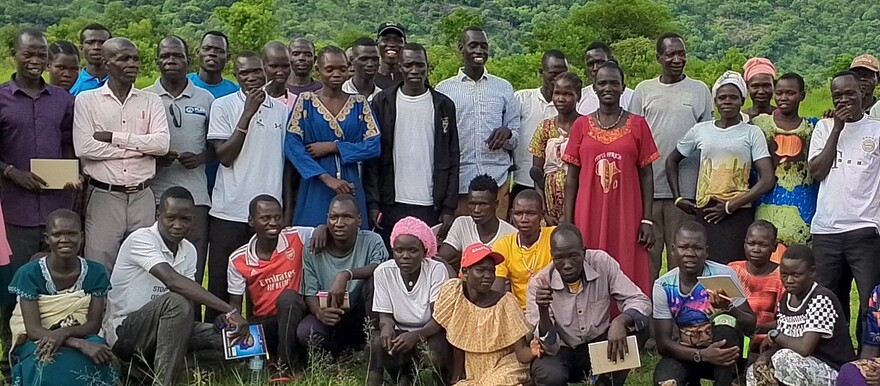The Justice and Peace Commission of the Catholic Diocese of Torit, supported by Norwegian Church Aid (NCA), conducted an election awareness event with government stakeholders and community groups in Himodonge, Torit County, on Wednesday.
The one-day event drew 47 participants from the five bomas of Himodonge Payam, including Oruhoi, Ofong, Angaim, Otose, and Keberek. The participants included youth, women, elders, and intellectuals from the area.
Himodonge, meaning “nose of the mountain,” is located in the Imotong mountains, a significant site where the Anyanya fighters who initiated the Torit mutiny, marking the first civil war in Sudan against Arab oppression, were buried in mass graves.
The commission, in collaboration with civil society, aims to educate grassroots communities on the peaceful conduct of elections and their outcomes. This first-of-its-kind event generated mixed reactions from locals, who generally welcomed elections but expressed doubts about their occurrence given South Sudan’s current struggles.
Oburak Livio, one of the participants, emphasized the need for improved security as a prerequisite for the December polls.
“Nobody should go and intimidate anyone; security must be provided so we can go for elections without interference. Returnees should be brought back to their homeland, and our people in Kenya must be brought to vote. Corruption should be avoided; our leaders are very corrupt every day. We have to go for elections to get rid of this. Disarmament should be done across the whole country for peaceful elections. The government should provide basic needs like food first; how can you stand in line while hungry?” Oburak said.
He added, “We must have national identity cards to prove South Sudanese citizenship and avoid scams from neighboring countries. We need good roads to access all areas during elections, especially in frequently flooded places like Bor. Communities also need peaceful dialogues because some neighbours fear talking to us. We need understanding among ourselves before elections. We also need gender equality so that women can be elected as president, chiefs, and parliamentarians. A census is necessary before elections so the government knows the number of South Sudanese citizens and its capacity. Salaries must be given equally and on time to workers.”
Agona Okwahi Gudio, one of the female participants, highlighted the hunger crisis currently affecting the country, which may impact the elections.
“We don’t know if these elections will go well or not. There are unnecessary killings, and we fear the elections will lead to more deaths rather than peace. The upcoming president should not be like the current one; we need peace and freedom without fighting like in 2016. Every citizen must participate freely and without fear. We need good roads, like those in developed countries, good schools, and communication networks,” Agona said.
Basilio Molong, the head chief of Himodonge, praised the awareness event, believing it has prepared his community for future elections.
“Today, we learned a lot and are ready for the coming elections. We will pray for peace to guide us until election time. The awareness event is one of the many positive steps forward. I want to tell my people to remain positive when hearing such information. God will guide us to elect the right leader when the time comes. I thank the organizers for raising awareness. We must pray that no insecurity disrupts the elections. Elections and peace are for all of us; without peace, we cannot stay here,” Chief Molong said.
Oryema Emmanuel, a civil society activist and state coordinator for the South Sudan Network for Democratic Elections, highlighted the timeline for the country’s roadmap, which ends on January 22, 2025, according to the parties’ agreement.
“We are to have the new government, and the election results will determine that after the December polls,” Emmanuel stated. He emphasized that the election process has been long and deliberate, aimed at allowing citizens to choose leaders who can deliver services and be accountable.
Emmanuel noted that South Sudan has never held elections before, making it crucial for citizens to prepare for peaceful and transparent elections. “For genuine elections, many steps need to be completed, including conducting a census,” he explained.
He stressed the need for a constitution, referring to Chapter 6 of the agreement, which discusses a permanent constitution involving public participation. “Elections are the last activity in the agreement and will occur two months before the end of the transitional period,” he added.
Vitale Ofire Rafael, an SPLM-IO member of the state legislative assembly from the area, believes that a permanent constitution is essential to prevent individuals from manipulating the country for personal gain.
“Citizens have a role to play. During our meeting with the national election high committee, we agreed on the need for constituency demarcation before elections, which requires a census and voter registration,” Ofire stated. He pointed out that voter registration must be completed six months before elections, stressing the importance of proper preparation.
Ofire also raised concerns about potential violence if forces are not unified, predicting that parties may not accept election results peacefully. “If the forces are not unified, we may see violence, as parties might not accept failure and could resort to intimidation,” he warned.
He cited the example of Himodonge and Kudo, which are part of a single, large constituency due to corruption in the 2008 census, resulting in underrepresentation.




